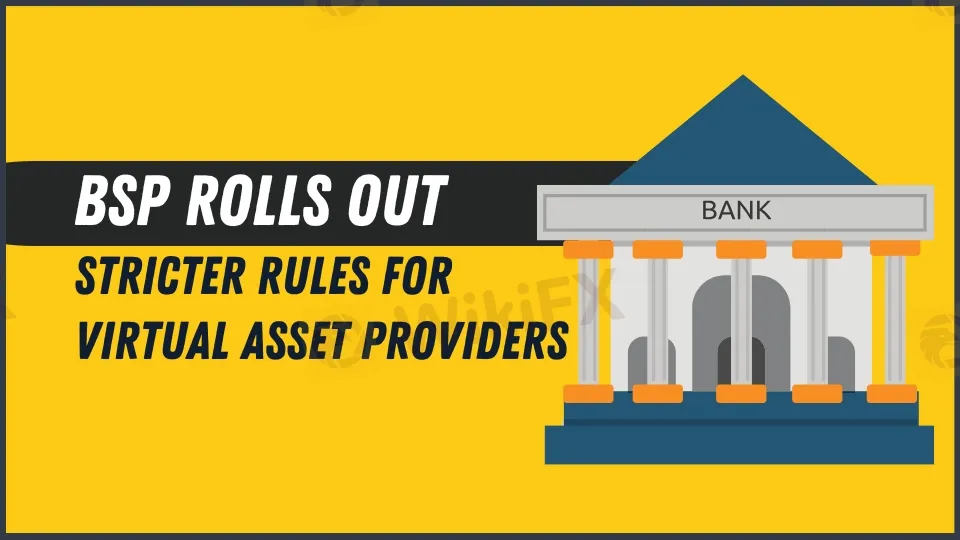简体中文
繁體中文
English
Pусский
日本語
ภาษาไทย
Tiếng Việt
Bahasa Indonesia
Español
हिन्दी
Filippiiniläinen
Français
Deutsch
Português
Türkçe
한국어
العربية
BSP Rolls Out Stricter Rules for Virtual Asset Providers
Abstract:The Philippines enforces new virtual asset reporting rules starting January 2025, mandating 13 comprehensive reports from VASPs to ensure transparency and security.

The Bangko Sentral ng Pilipinas (BSP) is ramping up its oversight of the virtual asset industry with enhanced reporting standards for Virtual Asset Service Providers (VASPs). Starting January 1, 2025, a new reporting system will require VASPs to submit 13 distinct reports at varying intervals, aimed at improving transparency, data accuracy, and regulatory efficiency.
To streamline this initiative, the BSP will launch a new reporting portal. A recently issued draft circular outlines stricter data submission requirements, giving the industry until December 13 to provide feedback before final implementation.
New Reporting Requirements
Under the updated rules, VASPs must submit:
- Monthly Reports: Two reports covering transaction volumes, transaction values, and total assets under custody.
- Quarterly Filings: Seven reports detailing operating office locations, website information, and account holder demographics.
- Semi-Annual Reports: Three additional submissions.
- Annual Report: An audited financial statement.
These requirements aim to address data inconsistencies, close gaps in oversight, and promote trust and stability in the virtual asset market.
Shifting to a Modernized Portal
Initially, VASPs will continue using existing Money Service Business (MSB) reporting channels in the first half of 2025. From July onward, the BSPs newly introduced reporting portal will become the standard platform, enhancing the efficiency of regulatory monitoring.

The BSP emphasizes that non-compliance with the updated standards will prompt enforcement actions, reflecting its dedication to maintaining a secure and transparent financial ecosystem.
Industry Landscape and Public Advisory
Currently, only 14 BSP-registered VASPs operate in the Philippines, with seven actively engaged in business.Major players include Maya Philippines, Philippine Digital Asset Exchange (PDAX), and Coins.ph, among others. The BSP continues to warn the public about the risks of transacting with unregistered or overseas-based operators, urging vigilance against potential scams or financial misuse.
National Security and Broader Financial Regulation
The new measures coincide with the Philippines broader financial and national security agenda. In July 2024, President Ferdinand Marcos Jr. banned online gambling, citing its links to severe crimes such as human trafficking, murder, and kidnapping. This crackdown on Philippine Offshore Gaming Operators (POGOs) highlights a unified approach to combating financial crimes while fostering innovation and safety within the financial system.
The BSP‘s decision to enhance virtual asset regulations reflects its commitment to protecting users and balancing growth with security. By addressing anonymity risks, transaction speed vulnerabilities, and price volatility, the central bank aims to create a resilient framework for the country’s growing virtual asset sector.
Final Thoughts
The Philippines is stepping up its game in regulating the virtual asset industry with an intricate reporting framework. These enhanced measures are a vital step toward ensuring financial stability, transparency, and trust in an evolving digital economy. As the BSP tightens its oversight, industry players must adapt to a more structured system while the public benefits from a safer virtual asset ecosystem.

Disclaimer:
The views in this article only represent the author's personal views, and do not constitute investment advice on this platform. This platform does not guarantee the accuracy, completeness and timeliness of the information in the article, and will not be liable for any loss caused by the use of or reliance on the information in the article.
Read more

Rising U.S. Corporate Bankruptcies Deepen Economic Concerns
In 2024, 686 U.S. companies filed for bankruptcy, marking the highest number since 2010.

US Dollar Insights: Key FX Trends You Need to Know
Commodity Trading Advisors (CTAs) have maintained a strong long position in the US dollar, with gains in the previous five weeks and 13 of the prior 14 weeks.

Top 3 U.S. Crypto Policies to Watch in 2025: What to Expect
Get ready for 2025! From stablecoin rules to SEC vs. CFTC oversight and a bold Bitcoin reserve plan, here’s what to watch in U.S. crypto policies.

Why Is Nvidia Making Headlines Everywhere Today?
Nvidia, the $3 trillion tech leader, is revolutionizing AI with cutting-edge GPUs and accelerated computing, shaping the future of industries worldwide.
WikiFX Broker
Latest News
Ghana Trader Jailed for $300K Forex and Crypto Scam
US Dollar Surge Dominates Forex Market
Hong Kong Police Bust Deepfake Crypto Scam Syndicate Involving $34 Million
Is it a good time to buy Korean Won with the current depreciation?
Pepperstone Sponsored the "Aston Martin Aramco Formula One Team"
ACY Securities Integrates MetaTrader 5 to Enhnace Copy Trading Service
Soegee Futures Review: Should You Trust This Broker?
Malaysian Pilot Loses RM1.36 Million in UVKXE Investment App Scam
Indonesia officially joins the BRICS countries
Attention! Goldman Sachs Cuts Gold Target to $2910
Currency Calculator






